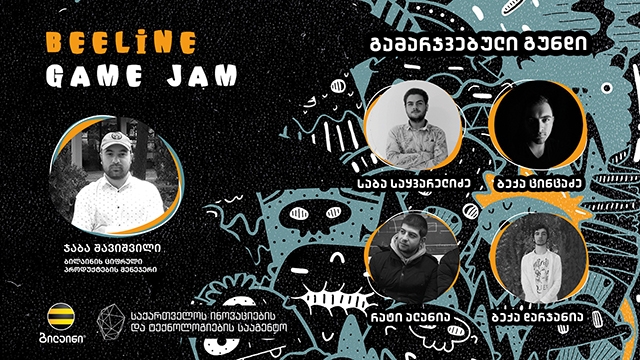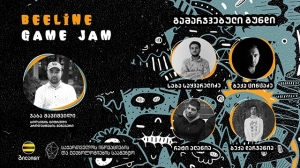How a Team of 4 Students Became a Beeline Business Partner
Interview
The digital direction has long been an integral part of Beeline's strategy, and this is reflected in the company's activities, among them sponsorship of hackathons, support of technology conferences, and cooperation with startups.
The company is actively involved in the development of Georgia's digital ecosystem, even in the face of the pandemic. However, this time Beeline held a hackathon, Beeline Game Jam, and appeared in the role of organizer. GEORGIA TODAY talked to Jaba Shavishvili, Beeline Digital Products Manager, and members of the winning team, AbsoluteZero, about the results of the event and future plans.
How did you come up with the idea of the hackathon, and what was the purpose of it?
After activating the gaming direction of the company at the beginning of the year, and gamifying our telecom services, we actively started searching for Georgian partners in this direction, thinking that a hackathon would be the easiest way to meet the right people and would also establish Beeline as an innovator in the local space in terms of gaming, for the first time. Game Jam had two goals: first, of course, to find a partner we would work with in the long run, and second, to support the local developer community, as we think such events (especially in this situation) help generate new ideas, encourage start-ups, and so on. The main concept was to bring together teams working in the field in a single space.
What results did you get and how well were your expectations met?
Considering we had to hold the event online, we had very good results. We deliberately chose not to restrict the teams participating in the hackathon so newcomers were also given the opportunity to demonstrate their capabilities. Up to 26 teams and more than 70 people participated in the Beeline Game Jam online event. We had 10 mentors with different competencies who helped the teams to create the right prototypes for the games and also held presentations from speakers on five unique and specific topics, whose tips proved important to the teams.
In the end, we got prototypes of very interesting games, the further development and ideological expansion of which is only a matter of time. Beeline selected only three teams for collaboration this year. The business partnership includes a revenue-sharing model, which means that the winners will not only receive motivational prizes, but also the products created at the hackathon will become a source for their long-term income.
What future plans does Beeline have in terms of games, and will a similar hackathon be planned in future?
Based on the results of Beeline Game Jam, we want to make this event an annual tradition and cooperate more actively with the community of local game developers. We hope that next year we will be able to carry out this process in a physical space and on a much larger scale. Regarding Beeline games: very soon we’ll add games that will allow users to win not only internet packages, but also voice packages. In addition, we’ll soon be inviting customers to our updated portal, which will include a list of leaders, blogs and a lot of other interesting information. We also plan to hold regular incentive competitions, which I think will further increase engagement. The goal is to get both consumers and game developers interested in our offerings and to create exciting products with them for the digital ecosystem of the future.
Team AbsoluteZero
Why did you decide to participate in the Beeline Game Jam, and what was your main motivation?
Beka Tsintsadze: We like hackathon-type events, and as soon as we saw that Beeline was hosting Beeline Game Jam with interesting prizes and mentors, we immediately decided to participate.
What obstacles did you encounter while working on the idea?
Beka Darjania: Due to the HTML5 format, we were limited in resources and had to give up sophisticated technologies, which led to the creation of an Arcade / Runner style game, which in the end turned out to be very catchy. We became intrigued ourselves and just followed the idea to the end.
How long did it take you to create a prototype of the game, and how did you assign the roles?
Rati Alania: It took us 8-10 hours to create a prototype of the game. We assigned roles within minutes of starting work, and then worked synchronously on everything, so we gained time, which we then used to correct any flaws we encountered.
How well did the Hackathon meet your expectations, and what experience did it bring apart from winning?
Saba Sakvarelidze: It exceeded our expectations. The competition was quite high and we did our best to make our final product special. Regarding the experience: First of all, we developed the ability to work in a team. We listened to each other, agreeing on every detail, from the schedule to the audio effects. We had a shared screen, which made us feel as if we were sitting next to each other and helping each other.
What do you think contributed to your victory, and what would you recommend to the participants of future hackathons?
AbsoluteZero: Before they start working on planning and coming up with an idea, create a vision, assign responsibilities, and create a prototype as soon as possible to see if it is worth continuing, or if it’s better to return to the idea phase. We followed this path, which probably led to our victory.
By Ana Dumbadze











